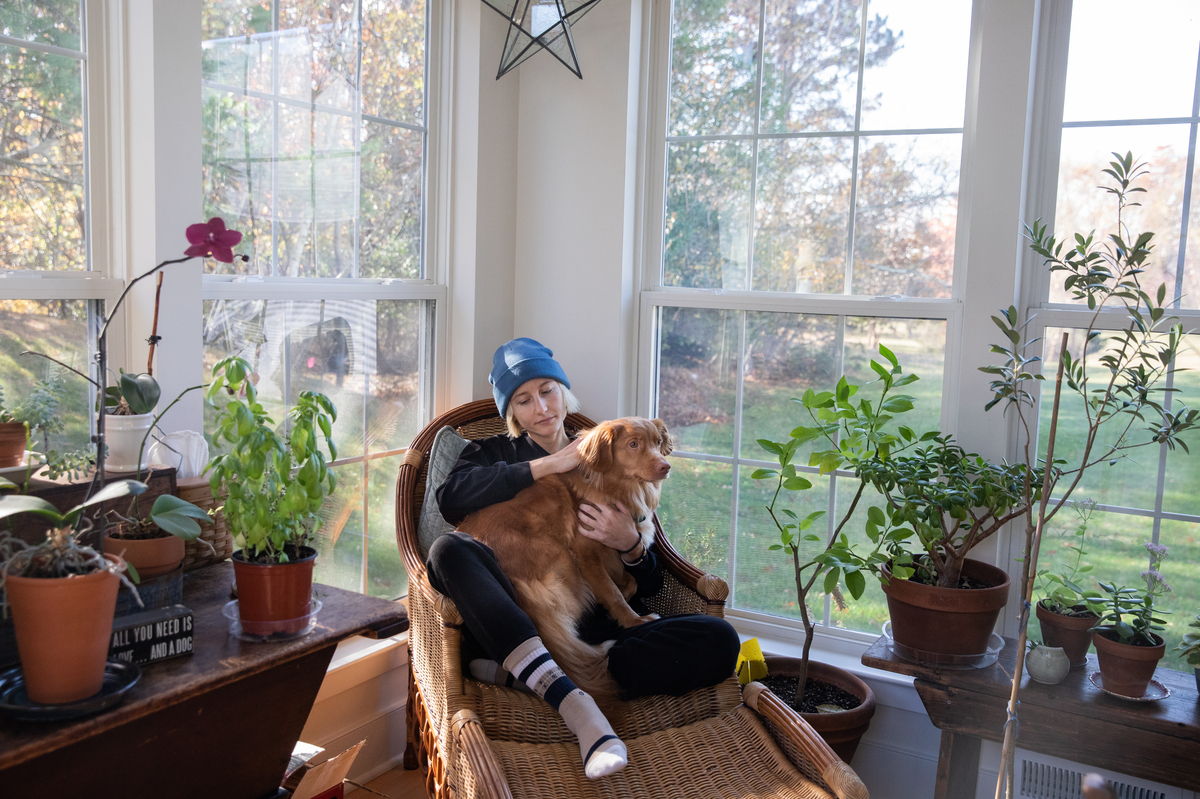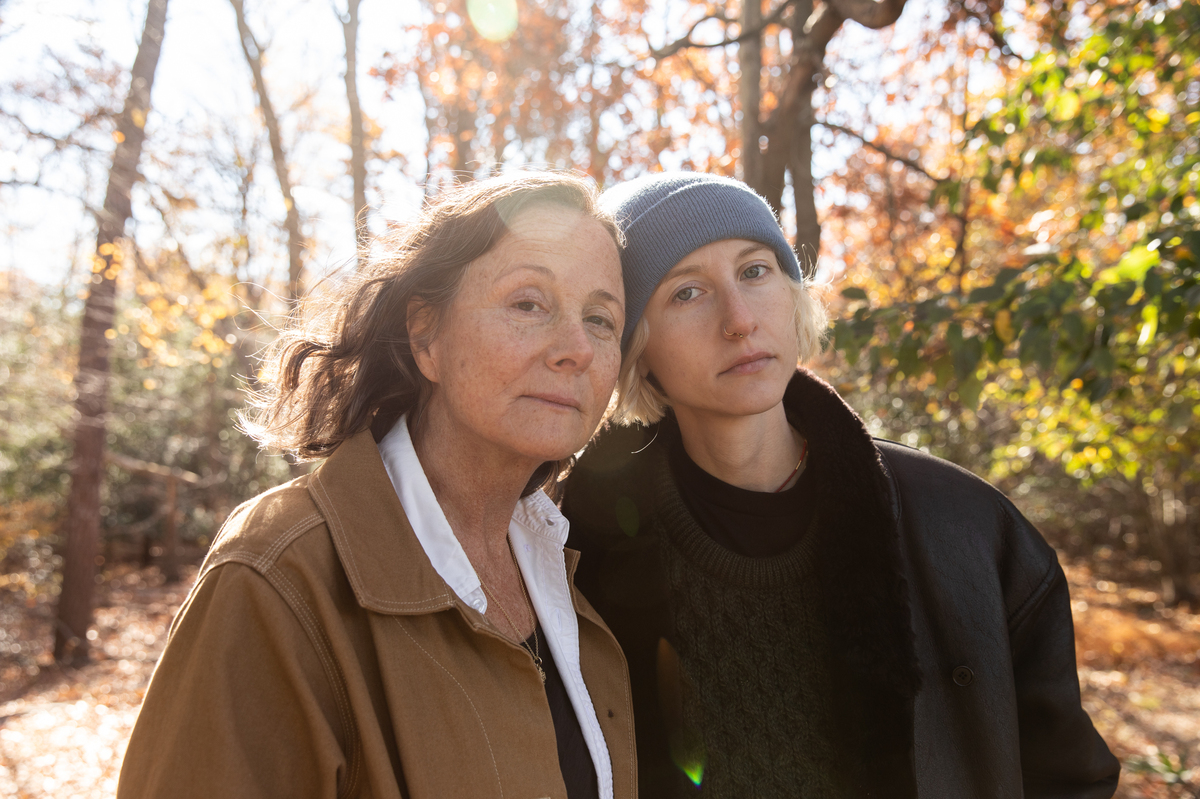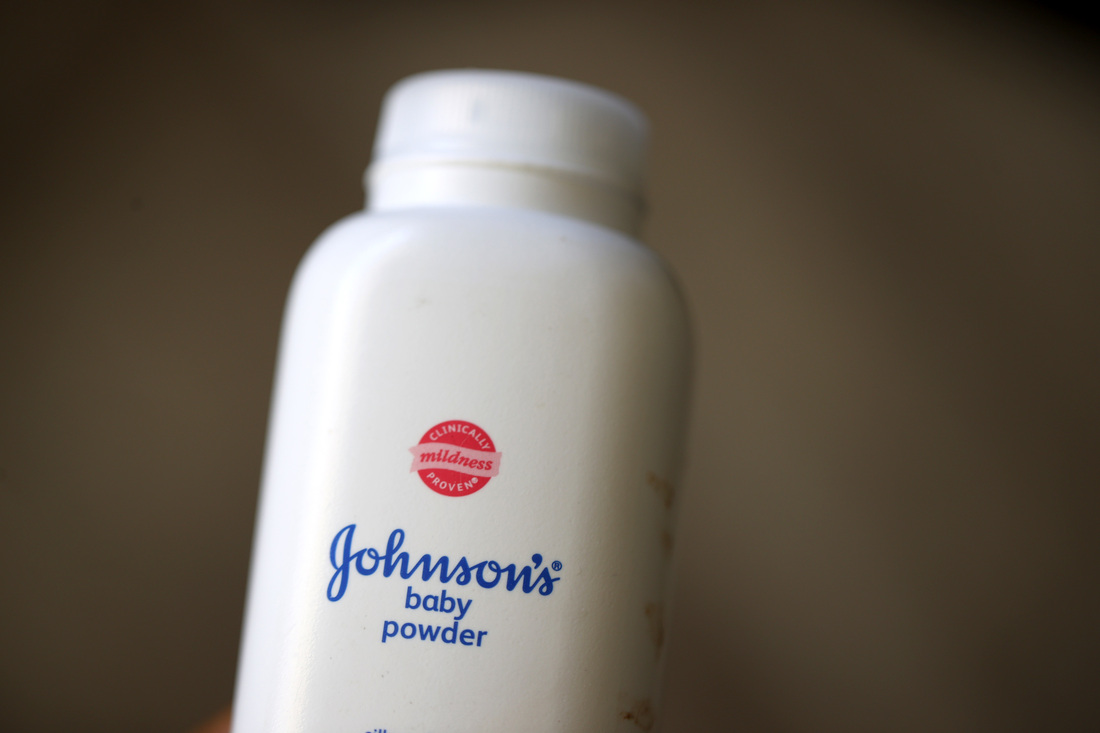
Hanna Wilt outside her home on Nov. 19, 2021, in Manasquan, N.J. Wilt was diagnosed with terminal cancer attributed to asbestos exposure a few years ago and joined many suing Johnson & Johnson over its talcum baby powder, which she believed exposed her to asbestos.
Jackie Molloy for NPR
hide caption
toggle caption
Jackie Molloy for NPR

Hanna Wilt outside her home on Nov. 19, 2021, in Manasquan, N.J. Wilt was diagnosed with terminal cancer attributed to asbestos exposure a few years ago and joined many suing Johnson & Johnson over its talcum baby powder, which she believed exposed her to asbestos.
Jackie Molloy for NPR
A few months before she died in February at age 27, Hanna Wilt was living at her mom’s home on the New Jersey shore.
“I’m tired and I’m very very bloated,” she said. “I get fluid buildup in my belly.”
It was a sunny morning, the living room filled with light that caught in Wilt’s yellow hair, but she was having a tough day.
She sat in a big stuffed chair, hunched forward holding her stomach. “Essentially you starve to death, is the nature of this disease,” Wilt said.
Wilt was a college athlete, a CrossFit instructor and an avid horseback rider. Then at age 22 she felt the first symptoms of an aggressive form of cancer called mesothelioma.
“It was really, really weird,” Wilt recalled. “I started not being able to walk right.”
Now, after years of unsuccessful treatment, she was terrified by the rapid advance of her illness. But along with the fear, Wilt also voiced outrage and frustration.
Her lawsuit against Johnson & Johnson, the company she blamed for making her sick, had been abruptly blocked a few weeks earlier.

Hanna Wilt with her dog Haku in November in Manasquan, N.J. Wilt was 22 when she felt the first symptoms of an aggressive form of cancer called mesothelioma.
Jackie Molloy for NPR
hide caption
toggle caption
Jackie Molloy for NPR

Hanna Wilt with her dog Haku in November in Manasquan, N.J. Wilt was 22 when she felt the first symptoms of an aggressive form of cancer called mesothelioma.
Jackie Molloy for NPR
“What I see is who can play the game best,” Wilt said. “Big corporations trying to work the system in a way that they don’t have to take full responsibility is nothing new.”
Johnson & Johnson, which is headquartered in New Jersey, is valued at more than $400 billion. But in October 2021, the company used a controversial legal maneuver in bankruptcy court to freeze Wilt’s case along with thousands of others.
The company had faced some 38,000 lawsuits claiming that trace amounts of asbestos contamination in Johnson’s baby powder caused ovarian cancer and mesothelioma.
“I would use it every day, sometimes a couple times a day to be comfortable in the summer,” Wilt said of J&J’s talcum powder.
In her lawsuit filed in January 2020, Wilt accused company executives of knowing about the risk for decades and keeping the information from customers.
She pointed to the FDA’s announcement in October 2019 that it had found asbestos in one sample of Johnson’s baby powder.
“There’s definitely an aspect of justice” in suing J&J and wanting her day in court to hold the company accountable, Wilt said.
“This powerful group of people, they lied and were able to potentially ruin so many people’s lives.”
A $400 billion company pulls the bankruptcy trigger
J&J pulled its iconic Johnson’s baby powder off the shelves in the U.S. in 2020, but the company says it took that step only because bad publicity had hurt sales.
Company executives, who declined NPR’s repeated requests for an interview, have long denied the product is contaminated or caused anyone’s cancer.
“The overwhelming scientific evidence proves Johnson’s baby powder is safe and does not cause cancer,” said Allison Brown, a company attorney, in a statement J&J sent to NPR.
Normally this is the kind of dispute civil lawsuits are meant to settle. A judge or jury would look at the evidence in a case like Hanna Wilt’s and decide whether J&J did anything wrong.
In recent years, Johnson & Johnson has successfully defended itself against many of these baby powder claims but has also lost on occasion.
After one baby powder trial in Oklahoma in 2018, J&J was eventually forced to pay 22 women with ovarian cancer more than $2 billion. That award survived an appeal to the U.S. Supreme Court last year.
But with most of the cases — including Wilt’s — still pending, the company found a way to stop the legal process in civil court, using a complex bankruptcy strategy known in legal circles as the “Texas two-step.”
Cancer patients and the Texas two-step
Here’s how the maneuver worked. First, last October, J&J spun off a subsidiary in Texas called LTL.
Then, using a wrinkle in Texas state law, J&J was able to transfer all of the potential liability linked to the tsunami of baby powder asbestos claims into the shell of the new company, while keeping valuable assets separate.
LTL then quickly filed for bankruptcy in North Carolina. That move immediately halted the baby powder cases, which could remain on hold for months or years.
Speaking on a public conference call with investors in October, one of J&J’s top executives defended the strategy.
“There’s an established process that allows companies … to resolve claims in an efficient and equitable manner,” said J&J Chief Financial Officer Joseph Wolk. “It’s really the bankruptcy courts that will ultimately decide this.”

Hope Schiller Wilt (left) and her daughter, Hanna Wilt, outside her home on Nov. 19, 2021, in Manasquan, N.J. The family plans to continue her lawsuit. “It’s what she wanted,” her mother said.
Jackie Molloy for NPR
hide caption
toggle caption
Jackie Molloy for NPR

Hope Schiller Wilt (left) and her daughter, Hanna Wilt, outside her home on Nov. 19, 2021, in Manasquan, N.J. The family plans to continue her lawsuit. “It’s what she wanted,” her mother said.
Jackie Molloy for NPR
But for families seeking compensation from J&J, the move by one of the wealthiest corporations in the U.S. sparked anger and dismay.
“It’s heartless; it’s ruthless,” said Hope Schiller Wilt, Hanna’s mother. “It’s disgusting that for monetary gain they will stop at nothing.”
“It is so expensive being sick,” added Hanna Wilt. “I can’t work, so I’m not providing an income. My Mom can’t work. She’s taking care of me.”
A separate justice system for “Bankruptcy Grifters”?
Legal experts tell NPR that a growing number of wealthy companies, organizations and individuals accused of serious wrongdoing are using similar bankruptcy tactics, hoping to delay or permanently block lawsuits.
They’ve found openings in state and federal law that allow them to leverage the…
Read More:J&J, worth $400 billion, is using bankruptcy to derail baby powder lawsuits : NPR
2022-04-02 11:00:47




